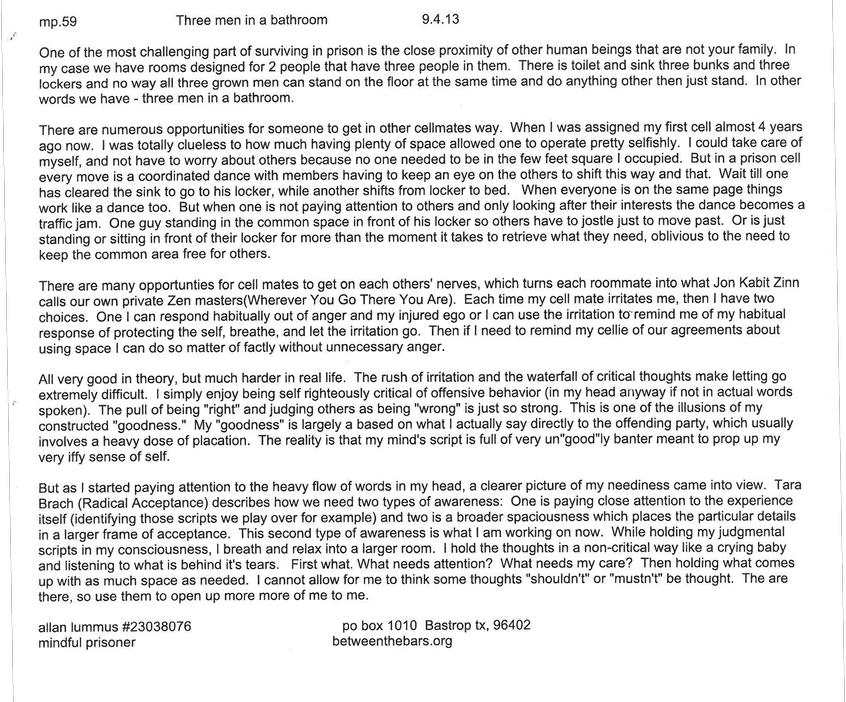
Transcription
mp.59 Three men in a bathroom 9.4.13
One of the most challenging part of surviving in prison is the close proximity of other human beings that are not your family. In my case we have rooms designed for 2 people that have three people in them. There is toilet and sink, three bunks and three lockers and no way all three grown men can stand on the floor at the same time and do anything other than just stand. In other words we have - three men in a bathroom.
There are numerous opportunities for someone to get in other cellmates' way. When I was assigned my first cell almost 4 years ago now. I was totally clueless to how much having plenty of space allowed one to operate pretty selfishly. I could take care of myself, and not have to worry about others because no one needed to be in the few feet square I occupied. But in a prison cell every move is a coordinated dance with members having to keep an eye on the others to shift this way and that. Wait till one has cleared the sink to go to his locker, while another shifts from locker to bed. When everyone is on the same page things work like a dance too. But when one is not paying attention to others and only looking after their interests the dance becomes a traffic jam. One guy standing in the common space in front of his locker so others have to jostle just to move past. Or is just standing or sitting in front of their locker for more than the moment it takes to retrieve what they need, oblivious to the need to keep the common area free for others.
There are many opportunities for cell mates to get on each other's nerves, which turns each roommate into what Jon Kabit Zinn calls our own private Zen masters (Wherever You Go There You Are). Each time my cell mate irritates me, then I have two choices. One, I can respond habitually out of anger and my injured ego or I can use the irritation to remind me of my habitual response of protecting the self, breathe, and let the irritation go. Then if I need to remind my cellie of our agreements about using space I can do so matter of factly without unnecessary anger.
All very good in theory, but much harder in real life. The rush of irritation and the waterfall of critical thoughts make letting go extremely difficult. I simply enjoy being self righteously critical of offensive behavior (in my head anyway, if not in actual words spoken). The pull of being "right" and judging others as being "wrong" is just so strong. This is one of the illusions of my constructed "goodness". My "goodness" is largely a based on what I actually say directly to the offending party, which usually involves a heavy dose of placation. The reality is that my mind's script is full of very un"good"ly banter meant to prop up my very iffy sense of self.
But as I started paying attention to the heavy flow of words in my head, a clearer picture of my neediness came into view. Tara Brach (Radical Acceptance) describes how we need two types of awareness: One is paying close attention to the experience itself (identifying those scripts we play over for example) and two is a broader spaciousness which places the particular details in a larger frame of acceptance. This second type of awareness is what I am working on now. While holding my judgmental scripts in my consciousness, I breathe and relax into a larger room. I hold the thoughts in a non-critical way like a crying baby and listening to what is behind its tears. First what. What needs attention? What needs my care? Then holding what comes up with as much space as is needed. I cannot allow for me to think some thoughts "shouldn't" or "mustn't" be thought. They are there, so use them to open up more of me to me.
allan lummus #23038076
mindful prisoner
po box 1010 Bastrop tx, 96402
betweenthebars.org
Other posts by this author
|
2017 sep 12

|
2017 may 31

|
2017 feb 23

|
2017 jan 15

|
2016 dec 11

|
2016 nov 26

|
More... |


Replies